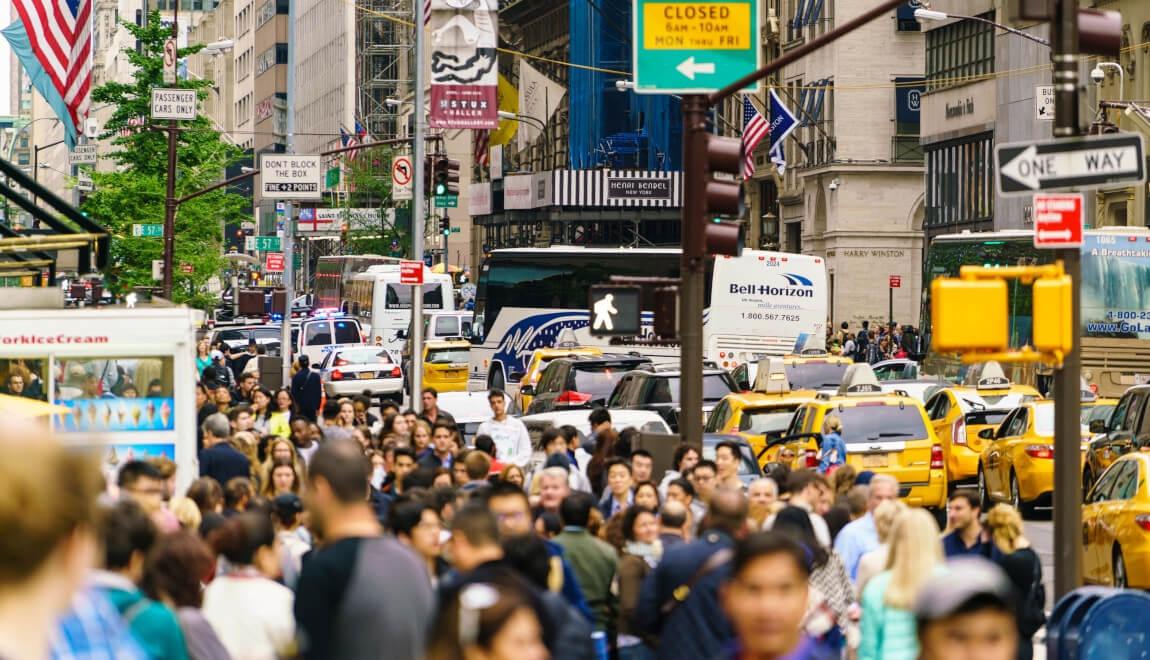For millions of people over hundreds of years, the New York City area has been their destination. Countless immigrants first set foot on American soil here. Starry-eyed hopefuls head to New York seeking love, fame, and fortune. People are retiring in New York City, too.
As baby boomers age, one in every five New Yorkers will be age 60+ by 2030, according to New York City’s Department of Aging. So why stay in the New York City area when you retire – or move here when you do? Below, we’ve compiled a list of pros and cons for retiring in New York City.
Pros of Retiring in New York City

Active Lifestyle
New York City and the surrounding areas are walkable and, for the most part, easy to navigate. Walking to the grocery store, doctor’s office, boutique, or deli every day is a great way to get in some exercise without having to join a gym. The New York City area also has beautiful beaches, parks, and other recreational areas to explore. Long Island alone boasts more than 50 beaches. North of the city, above Yonkers and the New Jersey suburbs, Harriman State Park provides 31 lakes and reservoirs, along with 200 miles of hiking trails.
World-Famous Culture
This is New York City, of course, the home of Broadway, prestigious museums, and the Metropolitan Opera. Imagine yourself taking the train into the city for lunch at a trendy restaurant, followed by a matinee viewing of a Tony Award-winning musical. If that’s your idea of a perfect day, the New York City area is the place to retire. The NYC metro, with some of the most diverse cities in the country, offers countless opportunities to experience new things and meet new people.
Easy (and Cheaper) Transportation
You may have heard it before: Nobody drives in New York City (except taxi and Uber drivers). Well, it’s true. Most New York residents ditch the car and opt for walking, biking, or taking public transit. The New York area can be expensive (we’ll get to that in a moment) but being car-free will certainly save you some cash.
If you live in areas outside the metro core, you can easily travel to surrounding towns and into the city via trains and the subway. Bonus: Once you hit 65, you qualify for a Reduced-Fare Metro Card. That gets you half-price rides on the subway, buses, the Long Island Railroad and Metro-North Railroad. (Learn more about senior discounts on travel here.)
Favorable Taxes (with Exceptions)
In general, New York’s tax situation is favorable for retirees, though that could vary depending on your age, property ownership, and income. Military, civil service, New York State and local pensions are non-taxable. This includes Social Security benefits. Also, as much as $20,000 worth of out-of-state or private pensions can be excluded from taxation for retirees age 59½ and older. If you’re over 65 and have a restricted income, you may also be eligible for a homestead property tax exemption, which will save you from the state’s relatively high property taxes.
Age-Friendly NYC
At 3.2 million, New York has more residents over the age of 65 than some states have residents. One in six New Yorkers is 65 or above, and this number is growing, up 26 percent in the last decade. Despite the high cost of living, New York is still a good place to retire due to its culture and overall wellness. The NYC Department of Aging offers a variety of programs for seniors and is targeting ageism with campaigns like Ageless New York.
Cons of Retiring in New York City

High Cost of Living
New York City is expensive, and Manhattan is more so. For example, a luxury assisted-living community in the heart of NYC could have rents as high as $20,000 a month. You’ll find more affordable options outside of Manhattan. Popular retirement spots in the NYC metro area include Long Island, the northern suburbs along the Hudson River, and northern New Jersey. But even in areas that are considered not as expensive by New York standards, many seniors struggle, especially those on a fixed income. Many retirees find they need to work to cover their bills, and poverty is high among seniors in New York.
The cost of living in the city is 68 percent higher than the national average. In some places, the cost of living is even higher. For example, the Hamptons, a popular New York retirement area, has a cost of living that’s roughly 140 percent higher than the national average. Middle Long Island isn’t quite as expensive, but the cost of living in cities such as Deer Park and Glen Cove is still about 50 percent above the national average.
New York Is Crowded
With roughly 8.5 million residents in a small geographical area of roughly 300 square miles, New York experiences constant noise and traffic congestion. If you like busy sidewalks and streets, crowded markets, and tons of tourists taking selfies in the city, you’ll love living in New York. However, if you’d like a little bit of quiet, you won’t find it here in the city that never sleeps.
Cold, Snowy Winters
It’s pleasant in New York from late May until mid-September. During this time, temperatures average 76 degrees or above. However, the winter months are a different story. From December to early April (and sometimes beyond), you can expect cold temperatures — the average is 48 degrees. You can expect it to snow an average of 10 or 11 days every month during the winter, as well. On average, New York gets nearly 30 inches of snow per year.
Are you ready to retire in New York?
Given the abundance of recreational and cultural opportunities, fantastic public transportation, and diversity, it’s easy to see why so many people can’t wait to retire in the Big Apple. If the pros outweigh the cons for you, New York can provide a lively lifestyle with plenty to see and do.




